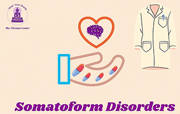
What are Unexplained Physical Symptoms disorders or Somatoform Disorders?
25 Nov 2020- We all have physical symptoms – painful or uncomfortable feelings in the body – at different times in our lives. Usually they get better on their own, without any treatment. If they don't, we might ask a doctor about them. Usually a physical cause can be found - but sometimes it can't, even when blood tests and x-rays or scans have been done.
- These Medically unexplained symptoms are quiet often seen in practice and are termed Somatoform Disorders.
- The somatoform disorders are a group of psychiatric disorders in which patients present with a myriad of clinically significant but unexplained physical symptoms.
- A person is not diagnosed with somatic symptom disorder solely because a medical cause can’t be identified for a physical symptom. The emphasis is on the extent to which the thoughts, feelings and behaviours related to the illness are excessive or out of proportion.
- These disorders should be considered early in the evaluation of patients with unexplained symptoms to prevent unnecessary interventions and testing.
- These disorders often cause significant emotional distress for patients and are a challenge to family physicians.
- Up to 50 percent of primary care patients present with physical symptoms that cannot be explained by a general medical condition. Some of these patients meet criteria for somatoform disorders.
- The unexplained symptoms of somatoform disorders often lead to general health anxiety; frequent or recurrent and excessive preoccupation with unexplained physical symptoms; inaccurate or exaggerated beliefs about somatic symptoms; difficult encounters with the health care system; disproportionate disability; displays of strong, often negative emotions toward the physician or office staff; unrealistic expectations; and, occasionally, resistance to or noncompliance with diagnostic or treatment efforts. These behaviours may result in more frequent office visits, unnecessary laboratory or imaging tests, or costly and potentially dangerous invasive procedures.
- People with somatic symptom disorder typically go to a primary care provider rather than psychiatrist or other mental health professional. Sometimes it can be difficult for individuals with somatic symptom disorder to understand that their concerns about their symptoms are excessive. They may continue to be fearful and worried even when they are shown evidence that they do not have a serious condition.
- For somatic symptom disorder, more important than the specific physical symptoms you experience is the way you interpret and react to the symptoms and how they impact your daily life.
- Role of Family Members/Care Taker: Symptoms cause very real distress for the person and reassurance isn't always helpful. Encourage your loved one to consider the possibility of a mental health referral to learn ways to cope with the reaction to symptoms and any disability it causes.
- A multitude of factors including Genetic predisposition and other biological factors, Modelling behaviour (Learned behaviour), Family influence, socio-cultural norms, individual personality traits etc can all play a role in the development of the disorder.
- Patients may have co-morbid (concurrent) psychiatric disorders.
- Management: The goal of treatment is to improve your symptoms and your ability to function in daily life. Psychotherapy, also called talk therapy, can be helpful for somatic symptom disorder. Sometimes medications may be added, to improve your symptoms and also to treat any co-morbidities.
- Remember: No two people are affected the same way by these complex multifactorial disorders and hencethere is no “one-size-fits-all” for treatment. The management needs to be individualized.
- Kindly meet your mental health professional for any unexplained physical symptoms immediately.
References:
- https://www.aafp.org/afp/2007/1101/p1333.html
- https://www.rcpsych.ac.uk/mental-health/problems-disorders/medically-unexplained-symptoms
- https://www.psychiatry.org/patients-families/somatic-symptom-disorder/what-is-somatic-symptom-disorder
- https://www.mayoclinic.org/diseases-conditions/somatic-symptom-disorder/symptoms-causes/syc-20377776